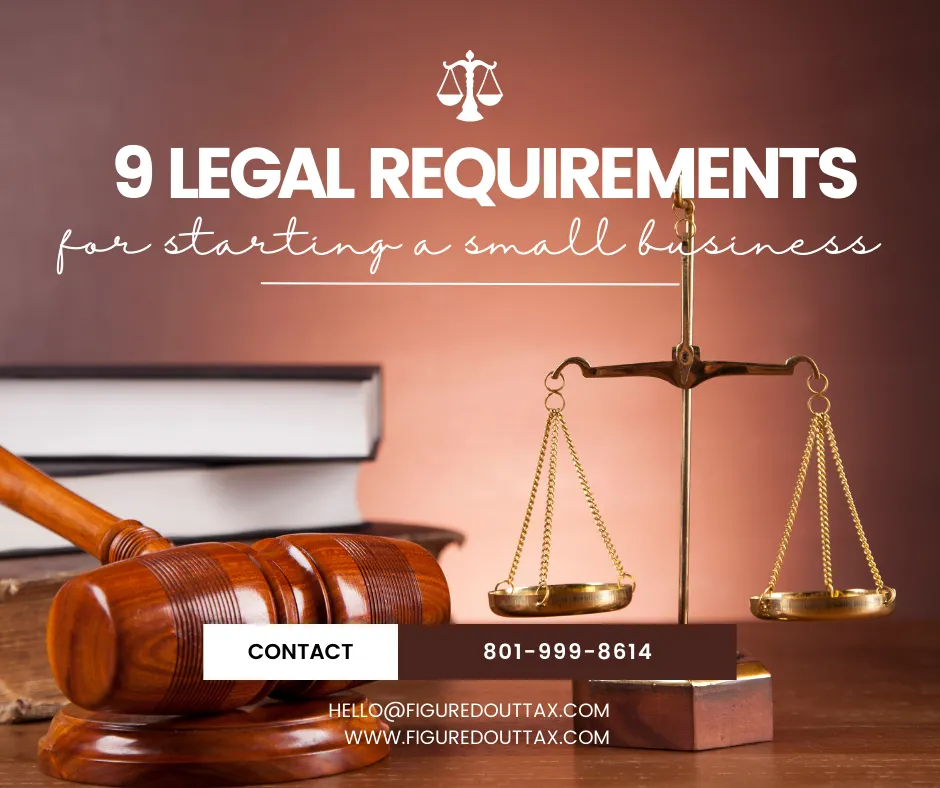| CALL US NOW!
Read Our Latest Blogs

9 Legal Requirements
“The first rule of business, protect your investment.” - Etiquette of the Banker 1775
We all have doubt and fear in the back of our minds that we’re never going to be able to do what we hope to do. We’re stuck in a cycle of working hard just to get by and starting a small online business legally can seem like a pipe dream.
I know if you’re reading this, you have some level of desire to break out of that cycle so here are 9 legal requirements for starting a small business. You can start tackling this right now to prepare yourself for your new life as an entrepreneur.

With that said, here are 9 requirements to keep things above board!
1. CHOOSE YOUR BUSINESS STRUCTURE
If you’re just starting out, your business may be structured as a sole proprietorship, partnership, limited liability company (LLC) or corporation. Here’s what each structure entails:
The first small business legal requirement is deciding what type of business entity you should be. There are four different types of business structures you can choose from, listed below:
Sole Proprietorship – This is the simplest type of business structure. As a sole proprietor, you report your business income and expenses on your personal tax return. You also have unlimited liability for all debts and legal actions against your business. This means that if someone sues or otherwise gets involved in your business, they can go after your personal assets to pay off any debts or judgments incurred by your company. Although sole proprietorships are easy to set up, they’re not recommended for most businesses because of the unlimited liability involved.
Partnership – Partnerships are also relatively easy to form and this type of business structure has been around for centuries. As with sole proprietorships, partnerships do not require filing with any government agency. However, there are some complex tax rules involved in partnerships so it’s best to consult an accountant if you’re considering this type of structure.
Limited liability company– An LLC is perfect if you want to pass profits and losses to members based on their contributions, offer both limited liability protection and the option to choose how you structure the company (member-managed or manager-managed). If you’re a single member LLC, you’ll be able maintain control of your business (managing the business) while keeping profits as personal income.
Corporation – Corporations have the most formalized structure and they’re more complicated to set up than the other types of businesses I’ve mentioned so far. The advantages of being a corporation include
Business owners need to consider several factors when choosing the type of legal structure for their companies.
These include:
The tax implications of each structure.
The amount of formal filing and record keeping required by each structure.
The personal liability protection that is afforded by each structure.
The cash flow needs and circumstances of the owner or owners.
2. GET YOUR EIN
Another legal requirement for your small business is getting your EIN. You can get your EIN by registering with the IRS using Form SS-4, as well as any other local offices or agencies that could affect your business license or taxes (such as city halls). EINs are necessary when:
You have employees.
You operate as a corporation or a partnership.
You file Employment, Excise, or Alcohol, Tobacco and Firearms tax returns.
You withhold taxes on income, other than wages, to a non-resident alien.
You have a Keogh plan.
You also need one when you are involved with:
Trusts, except certain grantor-owned revocable trusts, IRAs, Exempt Organization Business Income Tax Returns
Estates
Real estate mortgage investment conduits
Non-profit organizations
Farmers’ cooperatives
Plan administrators
3. SET UP A BUSINESS BANK ACCOUNT
The reason for this is simple: if your business is making sales and making money, you need to save the money in a separate account so that it isn’t mixed with your personal accounts.
This small business legal requirement is important because if you accidentally spend money that was meant for your business, the IRS will start to consider all of your money as theirs too. This means that they could start taking money from your personal accounts to pay for the business costs.
Setting up a business bank account is relatively easy, but you must contact the bank first and let them know that you are starting a new business. They will ask for some information about your business and how much money it will be receiving and sending. You can go ahead and give them some general ideas about it; however, don’t get too specific yet!
It’s best to wait until your small online business is well underway before you get more specific with them. Once they know more about what you are doing with the account, they may start asking you more questions and find a reason to deny your account.
4. CHOOSE A DOMAIN NAME NOT INFRINGING ON SOMEONE’S EXISTING TRADEMARK
And you’ll need a host for your website. A domain name is the website address people use to get to your site, like figuredoutfinance.com. Your hosting service is where your site lives on the Internet.
Typically, you will have an account with a hosting company (like GoDaddy) and they will provide you with a place to store all of your website files and a private space on the internet, so that when someone types in a domain name, they can see your website.
If you’re using a domain name that is a registered trademark, then the registered trademark owner may try to get your site taken down for infringement.
5. RESERVE YOUR SOCIAL MEDIA NAMES
Again, you’ll want your handles not to infringe on a registered trademark. This way, if someone else grabs the handle for the social media network that you want to use, you’ll still have time to grab another one. Of course, this isn’t something you should be doing until after you’ve decided which social media networks you want to use for your new site.
My recommendation is to grab the ones like: Facebook, Instagram, Pinterest, YouTube, and TikTok which are the more popular sites. If you don’t use them, you can always delete them or potentially sell them to someone who would like to use the name.
6. GET LICENSES AND PERMITS
Depending on the type of business you want to start, it may be a legal requirement while starting your business to have licenses or permits.
We all have doubt and fear in the back of our minds that we’re never going to be able to do what we hope to do. We’re stuck in a cycle of working hard just to get by and starting a small online business legally can seem like a pipe dream.
I know if you’re reading this, you have some level of desire to break out of that cycle so here are 9 legal requirements for starting a small business. You can start tackling this right now to prepare yourself for your new life as an entrepreneur.
7. SET UP YOUR CONTRACTS
It sounds boring, but getting all of your contracts in line is a critical small business legal requirement. Contracts like a privacy policy are legally required when starting an online business.
But you’ll also want a contract that protects your business like confidentially agreements for new hires and freelancers, as well as nondisclosure agreements for potential investors and partners.
8. LEGALLY ADVERTISE ONLINE
Advertising online is governed by the Federal Trade Commission. When advertising online, you’ll need to ensure that:
You’re following the CAN-SPAM act if you’re sending emails to an email list
Testimonials and endorsements must reflect the typical experiences of consumers, unless the ad clearly and conspicuously states otherwise.
Make sure you are making the appropriate disclosures
Any ads must be truthful, not misleading, and, when appropriate, backed by scientific evidence
You must allow people a way to enter a giveaway without requiring a purchase (you can see why here), and you must have official rules posted that govern the sweepstakes.
If you break FTC rules and your under their jurisdiction, that could mean:
Orders to cease and desist, with fines up to $43,792 per violation
Violations of some Commission rules also could result in civil penalties of up to $40,654 per violation. Violations of court orders could result in civil or criminal contempt proceedings.
Refunds to consumers for actual damages in civil lawsuits.
9. PROTECT YOUR NAMES AND CONTENT WITH COPYRIGHT AND TRADEMARK REGISTRATION
The battle against copycats is never-ending, but there are several things you can do to protect your rights.
To start, register your copyrights and trademarks with the U.S. Copyright Office and the U.S. Patent and Trademark Office to get a legal basis for fighting counterfeiters in court.
Next, tighten up security. Passwords have become the most common way of keeping people out of accounts, but that isn’t always enough. Use IP address blockers and encryption programs to keep out intruders trying to steal content or manufacture knockoffs.
Keep an eye on social media sites like Facebook and Twitter for discussions about your products that may lead to counterfeiting.
If you’re using a graphic designer, make sure you have the copyrights transferred to you before using the work. If you hire a freelancer to design your graphics or write your blog posts, make sure they sign a contract assigning the copyright to you as well.
FINAL THOUGHTS ON THE LEGAL REQUIREMENTS FOR STARTING A BUSINESS
As you can see, there are a lot of legal things that a new business owner has to do to run a business. There are also a lot of state laws and federal laws that apply to businesses.
Unfortunately, you can’t be sure which laws or rules apply to your business until you commit some kind of violation. Sometimes the penalties for the violations can be very costly or even devastating. Don’t let your business start paying fines for not complying with the laws and get your plan in place today.
ARE YOU READY TO LEGALLY PROTECT YOUR BUSINESS?
If you’re starting a new business, then you’re most likely looking for free or affordable resources. We’ve got them for you and when you're ready for some help, we've got your back with that too!
CLICK HERE FOR FREEBIES
CLICK HERE TO SCHEDULE A FREE CONSULTATION TO TAKE YOUR BUSINESS TO NEW HEIGHTS!

Hear What Our Clients Say
Customer Excellence is Our Daily Driver & Constant Measure of Success

Natalie Michaels

Figured Out and Kasey are true lifesavers! When I started my photography business, I felt overwhelmed with all the business setup, accounting, and tax questions. Thankfully, Kasey is there every step of the way, providing invaluable support and expertise. As I grow, Kasey continues to amaze me. She meticulously reviews my KPIs and helps me increase my cash flow and bottom line.

Emilee & Tyler Sharp

Kasey has been a game-changer for me, thanks to Kasey's expertise in business and taxes. The stress of quarterly payments used to weigh me down, but Kasey takes that worry off my plate. Her mind-blowing skills in handling taxes and optimizing my situation have truly impressed me. Figured Out is the place to go for all your accounting needs—I highly recommend them.

Kim Wexler

Her expertise in finding customized solutions to maximize deductions and ensure compliance is truly impressive. What sets her apart is her exceptional ability to break down complex tax concepts in a way that's easy to understand. Working with Kasey is a breeze—she's responsive, reliable, and always goes above and beyond to address any questions or concerns.

Jackson Owens

I can't express enough gratitude to Kasey for helping me sort out my taxes across multiple businesses as I transition into semi-retirement. Her optimization of my tax situation and her invaluable expertise have been a tremendous help. The stress-free process, thanks to her clear explanations of complex concepts, has been a relief. For professional and reliable tax assistance, I highly recommend Figured Out.


